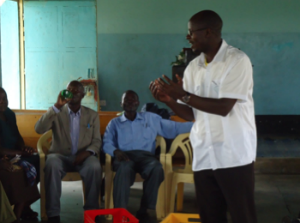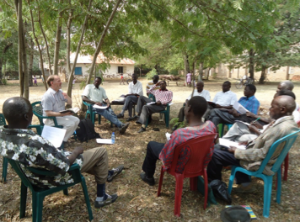 |
|
Tom Ochuka has a huge vision for local churches in the Nyanza region |
It’s something we all take for granted in the UK. Being able to go to a clean toilet in our churches and wash our hands afterwards. We sometimes moan, but these are luxury complaints about things such as the softness of the toilet paper or the coldness of the toilet rather than anything serious.
I have just come back from Kenya where the situation is very different especially in rural areas less than five per cent of households have access to a flush toilet. About half the households have a pit latrine and the rest use simply pits in the ground or even buckets. This lack of access to decent sanitation has a whole raft of consequences that one Church is trying to do something about as part of their Christina witness.
I had the great privilege of working with the Africa Inland Church in the country - one of the biggest denominations and Baptist by tradition. In the Kisumu region on the shores of Lake Victoria one pastor, the Revd Tom Ochuka, has a huge vision for the local churches. Tom is responsible for Health and Environment among the 72 churches in the Nyanza region of the country and has a desire for every church to have some decent toilets for members of the congregation and surrounding communities.
The vision though is not just one of comfort but has at its roots a desire that the church demonstrates a care for God’s creation as a whole as well as serving God’s people.
 |
|
James Hindson leads a Bible study |
Having decent toilets is the starting point for a whole range of other creation care issues. Toilets that do not flood during the rainy season are a key factor is protecting people from water borne diseases such as cholera.
At this time of year the normal drop toilets tend to overflow – and you can only imagine the health issues that raises! Linking a roof rainwater harvesting system to the toilets will also mean that people can wash their hands and have access to safe water during the rainy season when wells also run the risk of being infected.
But decent toilets do even more. Women and girls are those most affected through poor sanitation. As Tom said, 'If the church can provide better facilities for everyone – women and girls especially, then this can be a practical demonstration of care for God’s creation and love for our neighbour.'
Believe it or not though, toilets can also have economic benefits. If designed properly then waste can be collected, simply processed and used as fertiliser by farmers. In some case it might be possible to link the toilets to simple biogas plants to provide energy for cooking – reducing the need to cut trees down for wood fuel or spend a lot of money on charcoal.
Who would have thought it – better toilets leading to better health – showing respect and care for women and girls – and even helping a small way to reduce deforestation and help farmers. May be it’s not so surprising that Tom sees better toilets as a way of carrying a spiritual message to the community.
Toilets for Churches has the goal of providing decent sanitation for all churches in the region but we are starting small and planning to initially work with ten churches and get some feedback on our designs and toilets before building new toilets for all 72 churches. If you are interested in supporting the project through prayer, or if you might have a toilet design and building skill, or want to help fund some toilets, then get in touch with James Hindson at the address below.